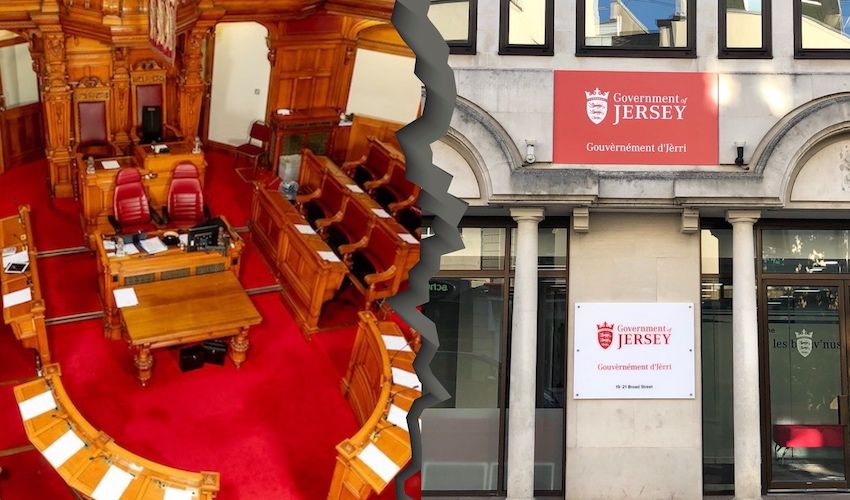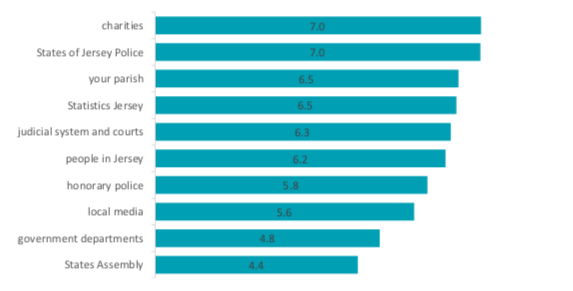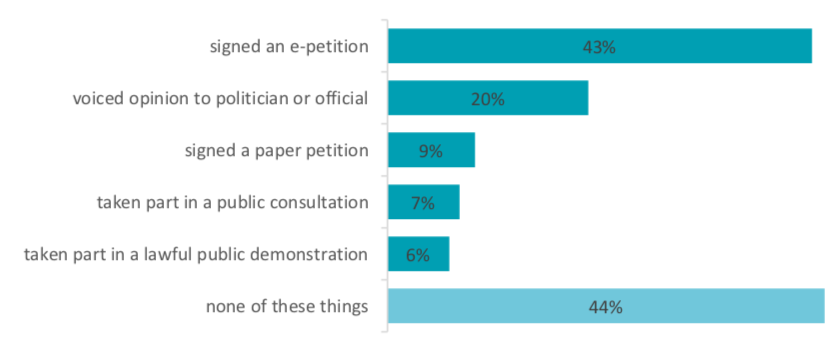


The government and States Assembly have been ranked as the least trusted institutions in Jersey.
The finding came in the latest Jersey Opinion and Lifestyle Survey (JOLS), in which islanders were asked to rate how much they trusted a list of institutions.
Over 3,400 households were selected at random to complete the survey in June and July 2019. In order to cover the entire adult population at random, the household member who next celebrated their birthday, and who was aged 16 years or over, was asked to complete the survey. A third (1,100 people) completed the questionnaire.

Pictured: Islanders were asked to rate how much they trusted a list of institutions.
Local charities and the Police received the highest score with 7, followed by parishes and Statistics Jersey with 6.5 and the judicial system and courts with 6.3.
Respondents ranked people in Jersey (6.2), the honorary police (5.8), the local media (5.6) ahead of government departments and the States Assembly, which scored 4.8 and 4.4 respectively.
The results showed that older age groups had more trust in the judicial system, parish system and honorary police than other groups.
In general, people whose households found it ‘very difficult’ to cope financially had lower trust in civic institutions (e.g. police, parish, judiciary, government departments and States Assembly), than those who found coping financially ‘very easy’ or ‘quite easy’.

Pictured: People whose households found it ‘very difficult’ to cope financially had lower trust in civic institutions.
St. Saviour Deputy Kevin Pamplin, who worked in the media before becoming a politician, said he believed the distrust expressed towards the Assembly is part of a global trend and the result of external factors.
“Right now, across the world in general politics and politicians are at their lowest ebb,” he said. “Here locally the lines are blurred because the world of Brexit, Boris and Trump overrides the conversations sadly.
The Deputy says that continuous access to news through social media, along with "24-hour commentary and opinion led information" feeds apathy.
“The greatest threat we have to democracy is that we do not share a common base line of facts,” he explained.

Pictured: St. Saviour Deputy, Kevin Pamplin.
“In another way, ‘Yes you are entitled to your opinion, but not your own version of the facts.’ Add to this is our not so straight forward election process and not so engaging access to local democracy then we will always be swimming against the tide.”
The Deputy, who was elected in May 2018, said that a number of States Members are trying to change this, “by reaching out and speaking truths, in ways that connect with everyone.”
Deputy Pamplin himself use his own social media regularly to share updates on the work he is doing, questions being asked in the Assembly as well as debates.
“The relationship has to work both ways and not just at election time and then not handed over to someone else to spin for you,” he said.

Pictured: Politicians and the States Greffe are using social media more to update the public about their work.
“It’s not just some of us members, but also the Assembly staff and Greffe,” he added. “Their social media has now become far more focused and engaging giving islanders a more easier route in.”
Deputy Pamplin however said that this needs more backing – which the Government plan had considered – so that all can share the work they do in the name of the Assembly, such as Scrutiny.
“We truly do investigate and hold Ministers to account, with fact based well researched evidence,” Deputy Pamplin said. “Some of the findings and responses have at times left me gobsmacked. I will continue to speak freely and do the work that islanders deserve and expect of us, but it’s not easy I accept.
“But I am keen to carry on with my approach and vision to make myself rise above this as ever and hopefully will have the same affect beyond me in being more open, transparent, and continue to build on trust in a genuine, thoughtful honest way.”
WE GO ON: Now back with colleagues here at Mourier House as our Scrutiny work goes on. Really important review panel meeting first, then my other health panel launches our next big piece of work. Much like our Mental Health review. #Alonsy pic.twitter.com/LFeUP4UvPB
— Deputy Kevin Pamplin (@KevinPamplin) December 3, 2019
Responding to the findings, a government spokesperson said that “the lack of trust in politicians is not unique to Jersey”, noting that global research into people’s attitudes to professions showed politicians and government ministers are among the least trusted in all the countries surveyed.
However, they said that Jersey's government is trying to reverse the trend, adding that they hoped the changes being made to the culture of government and the “delivery of improved services” will help increase public confidence.
The government will soon launch a new approach to handling feedback from islanders, which will allow them to gather feedback online, in person, and over the phone, and act on it promptly.
“We will use the information we gather to continue to improve the efficiency and effectiveness of the wide range of services we provide, as we are very aware that it is taxpayers who fund these services,” the spokesperson explained.
Pictured: Jersey's Government will soon launch a new approach to handling feedback from islanders.
It is hoped the changes will see civic engagement continue to increase. As the government noted, the survey showed “an encouraging trend in the increase in civic engagement amongst Jersey’s population".
Last year’s survey recorded that 34% of adults had signed an e-petition whilst 18% had voiced an opinion (either positive or negative) to a politician or government official.
Both of these statistics increased in this year’s survey to 43% and 20% respectively.
“We are committed to providing opportunities for islanders to engage with government,” the spokesperson said.

Pictured: Civic engagement increased in the last year according to the latest Jersey Opinion and Lifestyle Survey.
“Since the States Greffe introduced electronic petitions in 2018, they have been a popular way for islanders to interact directly with government.
“In the last few months, we have organised dozens of public meetings and consultations to enable islanders to have their say on significant policy issues, including the Government Plan, the Jersey Care Model, and Jersey’s future immigration system.”
Commenting on the media being ranked higher than politicians and government departments, Deputy Pamplin saids the most obvious reason is that they provide the news rather than “making them” like States members voting on law changes.
“Being an island forged on community the islands media have long played their part in keeping those traditions alive,” he said.

Pictured: Islanders appear to trust the media more than politicians and government departments.
“As we also know, we don’t have a lot of ‘News’ on a daily basis. So a lot of news on the island is more lifestyle and storytelling, showcasing the many of our 440 charities.
“It is a skill and an art connecting all of this with an audience and once that is done well, it’s like a faithful friend or companion that you trust even when passing on bad news.”
Comments
Comments on this story express the views of the commentator only, not Bailiwick Publishing. We are unable to guarantee the accuracy of any of those comments.